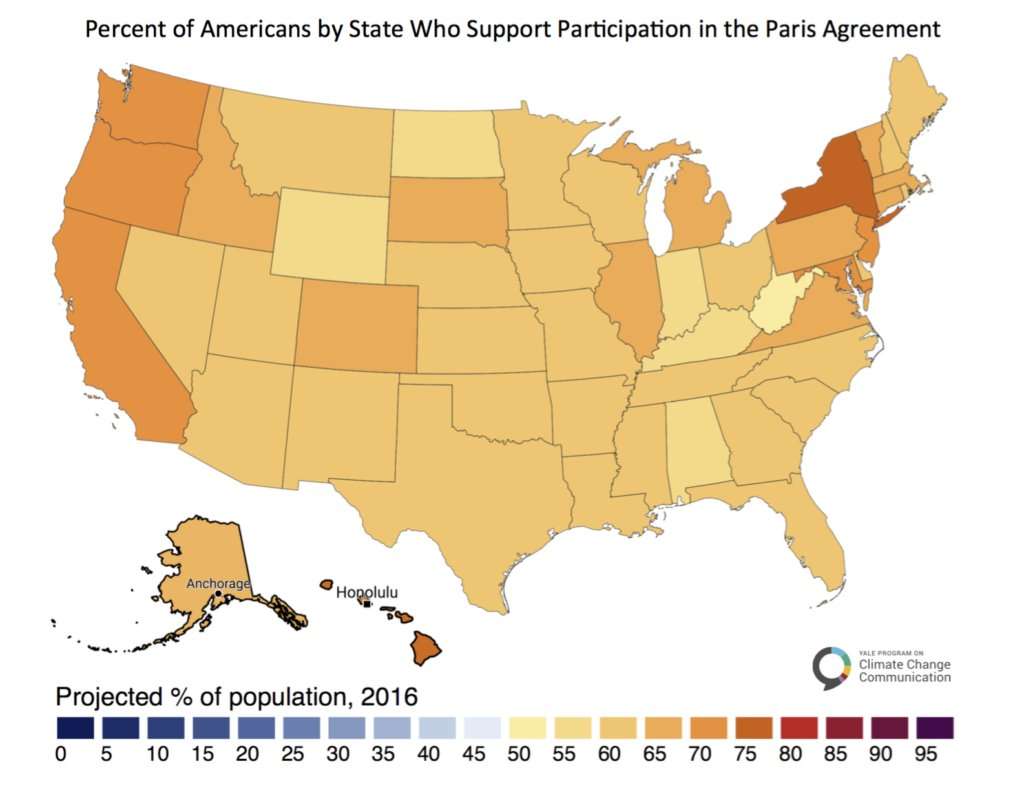Most Americans think the U.S. should participate in the Paris Agreement
In December 2015, officials from 197 countries (nearly every country in the world) met in Paris at the United Nations Climate Change Conference and negotiated a global agreement to limit global warming. On Earth Day, April 2016, the U.S. and 174 other countries signed the agreement, with most of the others following suit since then.
What do American voters in the U.S. and in every state think about U.S. participation in the Paris Agreement? And what do Trump voters think?
Using methods developed for the Yale Climate Opinion Maps, we find that a majority of Americans in every state say that the United States should participate in the Paris Climate Agreement. (For more details about this map, see Methods below.)
Using methods developed for the Yale Climate Opinion Maps, we find that a majority of Americans in every state say that the United States should participate in the Paris Climate Agreement.
2. By a more than 5 to 1 margin, voters say the U.S. should participate in the Paris Agreement.
In a nationally representative survey conducted after the election, we found that seven in ten registered voters (69%) say the U.S. should participate in the COP21 agreement, compared with only 13% who say the U.S. should not. Majorities of Democrats (86%) and Independents (61%), and half of Republicans (51%) say the U.S. should participate (including 73% of moderate/liberal Republicans). Only conservative Republicans are split, with marginally more saying the U.S. should participate (40%) than saying we should not participate (34%).
3. About half of Trump voters say the U.S. should participate in the Paris Agreement.
Almost half of Trump’s voters (47%) say the U.S. should participate in the Paris agreement, compared with only 28% who say the U.S. should not.
Two questions about the Paris climate agreement in two different surveys were posed to survey participants (the percentage of Americans who chose each response is in parentheses):
1. In your opinion, how important is it that the world reach an agreement this year in Paris to limit global warming? (n=1330; October 2015)
2. Do you think the U.S. should participate in this agreement, or not participate? (n=1226; November, 2016)
To estimate support among Americans in each state, responses to the two questions above were grouped into two categories — support or oppose — as follows:
Support = Q1: “A little bit important”, “Moderately important”, “Extremely important”, or Q2: “Should participate”
Oppose = Q1: “Not at all important”, or Q2: “Should not participate”
Margins of error for the state data are +/-10%, which includes potential error from the original surveys as well as from the modeling.

soil_nerd on June 1st, 2017 at 13:21 UTC »
The breaks on that map should really be 50-75, rather than 0-100. It's way too challenging to decipher between color classifications.
YVAN__EHT__NIOJ on June 1st, 2017 at 13:13 UTC »
Out of curiosity, can anybody figure out how they collected the data in the first place? Particularly, I'm curious who they are surveying.
It's a big difference if they are surveying a truly random sample of people vs a sample of people who visit some climate change site. All I see mentioned in methods are the questions asked in the surveys.
A quick google search finds http://uw.kqed.org/climatesurvey/index-kqed.php mention
I did the survey and some questions seemed to match, but the data is probably skewed if NPR-member sites are major points of proliferation for this survey.
umaddog2 on June 1st, 2017 at 11:46 UTC »
Majority of Americans have absolutely no idea any of the details of the agreement.